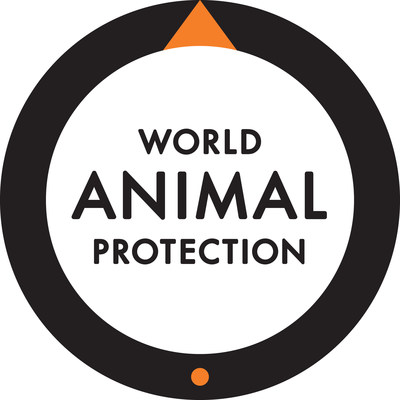Subjects: SVY, ANW
Report exposes damaging health impacts from factory farms expected to soar in United States alongside rising demand for meat
NEW YORK, April 7, 2022 /PRNewswire/ -- World Animal Protection's latest report, and website The Hidden Health Impacts of Industrial Livestock Systems, exposes how governments worldwide are turning a blind eye to the public health toll of factory farming including zoonotic disease spread, environmental contamination and worker wellbeing, as well as the suffering of billions of farmed animals.
By 2030, meat consumption is projected to grow 9% in North America[i]. This skyrocketing demand results in billions of stressed animals confined to cramped and barren cages or pens for their whole lives and subjected to painful physical mutilations. Over 70 % of the 80 billion land animals* farmed globally are raised and slaughtered within cruel factory farming systems each year. In the US that number is even higher at an estimated 99%.
The five pathways "through which food systems negatively affect our health", outlined by the World Health Organization in their 2021 report Food Systems Delivering Better Health[ii] is the source upon which this new research is based. World Animal Protection details how negative health impacts are directly linked to factory farming.
In the US, factory farms are fueling high rates of illness attributed to the pollutants and contaminants emitted by their operations, a harm that is more greatly borne by under-resourced communities and communities of color. The report also illustrates how the factory farm industry is damaging the mental and physical health of the millions of people who work to raise, transport, and process the billions of farmed animals in the US each year.
"The US government props up factory farming through federal programs that direct billions of dollars in public money to offset the high costs of industrial meat and dairy production, while exempting companies from paying for the damage they cause." says Cameron Harsh, Programs Director, World Animal Protection US.
"The damage being done by mega-farms that treat animals as mere commodities extends well beyond the individual facilities where the animals are raised and slaughtered."
Systemic shifts are needed to deliver the biggest health gains for our population. Some of those include re-orientating subsidies away from factory farming towards humane and sustainable practices, improving accessibility of plant-based foods, and providing transition support for farmers no longer wishing to engage in factory farming.
In order to realize these shifts, World Animal Protection is calling for the United States government on both a local and national scale to impose a halt on factory farms and, introduce and improve farmed animal welfare standards, and transition towards agroecological systems that produce sustainable plant-based foods.
World Animal Protection
World Animal Protection is the global voice for animal welfare, with more than 70 years experience campaigning for a world where animals live free from cruelty and suffering.
World Animal Protection has offices in 12 countries and works across 47 countries collaborating with local communities, the private sector, civil society and governments to change animals' lives for the better.
The organization's goal is to change the way the world works to end animal cruelty and suffering for both wild and farmed animals. Through its global food system strategy, World Animal Protection will end factory farming and create a humane and sustainable food system, that puts animals first. By transforming the broken systems that fuel exploitation and commodification, the organization will give wild animals the right to a wild life. Its work to protect animals will play a vital role in solving the climate emergency, the public health crisis and the devastation of natural habitats.
For more information on World Animal Protection, visit: http://www.worldanimalprotection.us/
Notes to Editors
- The report - The Hidden Health Impacts of Industrial Livestock Systems ? can be found here.
- he latest FAO/OECD Agricultural Outlook forecasts production of beef, pork, poultry, and sheep meat is projected to grow 5.9%, 13.1%, 17.8% and 15.7% respectively by 2030.
- *Excludes the number of farmed fish
[i] OECD/FAO. 2021. OECD-FAO Agricultural Outlook (Edition 2021). OECD Agriculture Statistics (database), https://doi.org/10.1787/4bde2d83-en (accessed 8th September 2021).
[ii] WHO. 2021. https://www.who.int/publications/i/item/9789240031814 (accessed 15th September 2021)
SOURCE World Animal Protection
These press releases may also interest you
|
News published on and distributed by:




